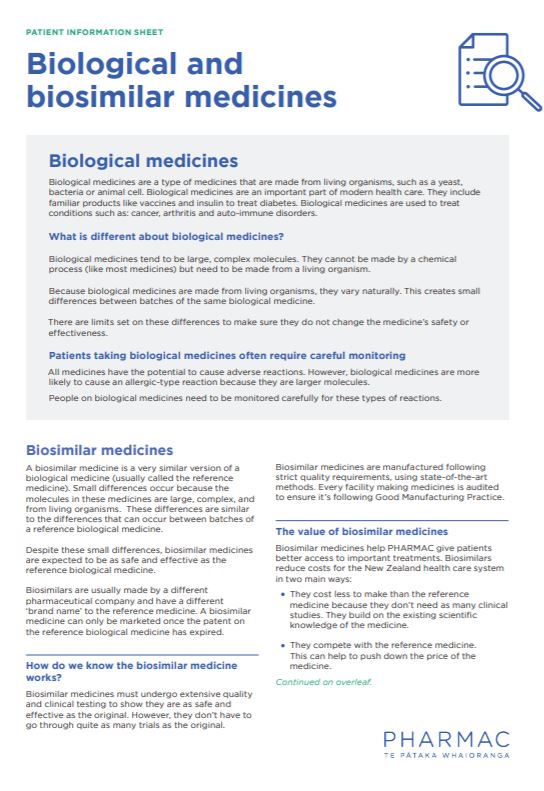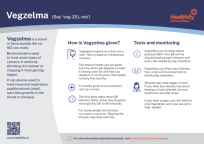Bevacizumab
Say 'be-va-SIZ-yoo-mab'
Key points about bevacizumab
- Bevacizumab is mainly used to treat different types of cancer.
- It's also used to treat some eye conditions and recurrent respiratory papillomatosis (small, wart-like growths in the airways).
- Bevacizumab belongs to a group of targeted therapies called monoclonal antibodies.
- Bevacizumab is known by the brand names Avastin® and Vegzelma®.
- Find out more about bevacizumab.

For cancer
Bevacizumab is mainly used to treat different types of cancer, alone or together with other anti-cancer medicines, to destroy cancer cells or slow down their growth.
- Bevacizumab belongs to a group of targeted therapies called monoclonal antibodies.
- It's called targeted therapy because it specifically acts on a protein called vascular endothelial growth factor (VEGF). This protein helps cancer cells grow a new blood supply.
- Targeting VEGF reduces the supply of oxygen and nutrients to the tumour. This can shrink the tumour or stop it growing.
For respiratory papillomatosis
Bevacizumab is also used to treat recurrent respiratory papillomatosis. This is a rare condition that causes small, wart-like growths (papillomas) in your airways, larynx and vocal cords. Bevacizumab is used as well as surgery and may help to:
- reduce the growth of these papillomas
- improve your voice quality, and
- increase the time between surgeries, helping to reduce the number of operations needed.
For eye problems
Bevacizumab is also used to treat some eye problems which cause loss of vision, such as ocular neovascularisation and exudative ocular angiopathy. Bevacizumab is injected directly into your eye (called intravitreal injection), by a healthcare provider and helps to slow vision loss. Read more about Avastin intravitreal injection(external link).
There are 2 brands of bevacizumab available in Aotearoa New Zealand
The original brand of bevacizumab is called Avastin. Vegzelma is a very close, but not identical, copy of Avastin. It's called a biosimilar medicine. Read more about biosimilar medicines.
From March 2025, Vegzelma, will be funded under a Special Authority, for people who meet the criteria. A special authority means your specialist will need to make an application to Pharmac (the government medicine funding agency) for approval before the medicine can be funded for you.
Bevacizumab is given as a drip into a vein (intravenous infusion) when it's used to treat cancer or recurrent respiratory papillomatosis.
- It's usually given once every 3 weeks, but can sometimes be given more often depending on your treatment.
- Your dose (the amount you are given) and the number of infusions you need depend on what it’s being used for and your response to treatment. It can be every few weeks to every few months.
- The first dose takes about 90 minutes, but other doses may be given more quickly (over 30 to 60 minutes) if it doesn't cause any side effects.
During the infusion
Bevacizumab is usually given by a nurse at an outpatient unit. For some people, bevacizumab may cause a reaction (called an infusion reaction) while it's being given so you’ll be carefully monitored during the infusion and for a period of time afterwards. Reactions can often be controlled by slowing the infusion.
Tell your nurse if you have any of these symptoms during your infusion:
- fever
- chills
- flushing
- skin rash, itching
- dizziness, headache
- trouble breathing.
Here are some things to know when you're having bevacizumab. Other things may be important as well, so ask your healthcare provider what you should know about.
- Tests and monitoring: Bevacizumab can cause an increase in blood pressure so your blood pressure will be checked before each infusion and every few weeks while you're on treatment. It usually settles down when treatment is stopped. Bevacizumab can affect your kidneys. Your urine will be tested before and during treatment.
- Slow wound healing: Wounds may take longer to heal while you're being treated with bevacizumab. If you have any wounds which are not healing or look infected, speak to your healthcare provider straight away. If you’re planning to have surgery, your healthcare provider will advise you to stop bevacizumab and only restart once your surgical wound is fully healed. This lowers your risk of bleeding and helps prevent problems with wound healing.
- Bevacizumab may cause jaw problems: Take good care of your teeth and mouth, have regular dental check-ups and let your dentist know you're having treatment with bevacizumab.
- Increased risk of infections: Bevacizumab, when given with other chemotherapy medicines, weakens your body’s defence (immune) system, so you're more likely to pick up infections. It's important to avoid anyone who has chickenpox or shingles.
- Pregnancy: You should avoid becoming pregnant while you're having bevacizumab and for at least 6 months after stopping treatment. Talk to your healthcare provider about which types of contraception are suitable for you and your partner.
- Vaccines: Some vaccines shouldn't be taken if you are on bevacizumab. Always check with your doctor or pharmacist first. The annual flu vaccine is safe.
- Taking other medicines: Bevacizumab may interact with a few medicines and herbal supplements, so check with your doctor or pharmacist before starting bevacizumab or before starting any new medicines. This includes those you may buy over the counter.
Like all medicines, bevacizumab can cause side effects, although not everyone gets them. You may experience side effects at any time during your treatment or even months after treatment has finished. Most of the side effects of bevacizumab are likely to improve after you stop having treatment, but some may last longer.
Note
- Bevacizumab is often used with chemotherapy, which can cause other side effects or make these side effects worse.
- To monitor your side effects, you'll need monitoring and blood tests to check your heart, liver, kidneys and blood before you start treatment and regularly while you're receiving treatment.
Common side effects |
|
If you experience these and they're not getting better or are getting worse, let your healthcare team know:
|
Rare, serious side effects |
|
For some people, these side effects could be life threatening. Call 111 for an ambulance if you have signs of an allergic reaction, such as trouble breathing, skin rash, or swelling of your face, lips, tongue, or around your eyes. If you have any of the side effects mentioned below OR any new or worsening symptoms, contact your healthcare team or Healthline on 0800 611 116 straight away:
Note: This is not a full list of side effects and side effects can vary for different people. If you don't know whether your symptoms are side effects of the medicine, contact your healthcare team straight away. |
The following links provide further information on bevacizumab:
Avastin(external link) Medsafe consumer medicine information, NZ
Vegzelma(external link) Medsafe consumer medicine information, NZ
Brochures
Biological and biosimilar medicines(external link) PHARMAC, NZ
Medicines and side effects [PDF, 91 KB] Healthify He Puna Waiora, NZ, 2024
References
- Bevacizumab(external link) NZ Formulary, NZ
- Avastin(external link) Medsafe datasheet, NZ
- Vegzelma(external link) Medsafe datasheet, NZ
- Decision to fund medicines for liver and ovarian cancers, and to award principal supply status for bevacizumab to Vegzelma(external link) Pharmac, NZ
Brochures
Vegzelma
Healthify He Puna Waiora, NZ, 2025

PHARMAC, NZ
Credits: Sandra Ponen, Pharmacist, Healthify He Puna Waiora. Healthify is brought to you by Health Navigator Charitable Trust.
Reviewed by: Healthify clinical advisors
Last reviewed:






